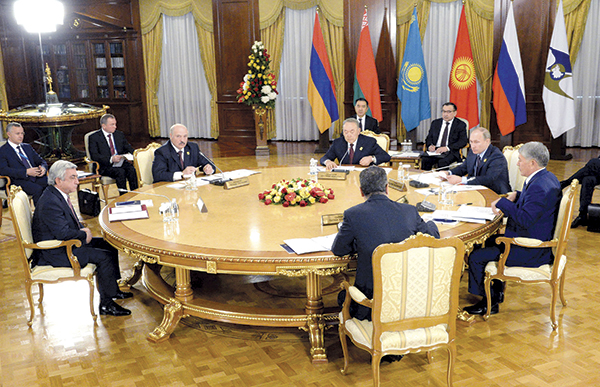The heads of state have discussed how best to reinforce the EAEU’s economic relations with third countries and key integration associations. Also high on the agenda was the formation of single markets for gas, oil and oil products within the EAEU, alongside major guidelines for the EAEU macro-economic policy for 2016-2017, and priorities for the Union’s international activity.

On the first day of the visit, Alexander Lukashenko met his Kazakh colleague, Nursultan Nazarbayev, agreeing that Minsk and Astana need to take measures to overcome negative trends in our trade-economic cooperation.
Well-known factors affect our bilateral interaction, including the complex situation on world markets, as well as in Russia and in Ukraine: both major trade partners for Belarus and Kazakhstan.
Friendly conversation between our two presidents has always yielded fruit, and Mr. Lukashenko noted his confidence that this will remain true, identifying efficient instruments to overcome problems. Rejuvenating mutual trade turnover is the main priority at present, with both presidents eager to promote trade-economic interaction, through governmental liaison.
Cooperation across the sci-tech sphere is also important, with several proposals on the table. The Belarusian President believes that concrete decisions must be taken by the time that President Nazarbayev visits Minsk.
“No crisis lasts forever,” asserted the President of Kazakhstan. “We’re now working on further strategic collaboration.”
In extended format meetings, the EAEU summit in Astana included around 15 issues for discussion, with corresponding decisions adopted. During the first year of the EAEU work, we’ve been left with ambiguous impressions. On the one hand, through integration, our countries have considerably reduced risks, minimising the negative consequences of global shocks on world markets. On the other, obstacles remain to mutual trade, as Mr. Lukashenko underlines.
Integration without a shared economic space makes no sense, since we cannot unite without a unified market for hydrocarbons, electricity, medicines and liberalisation of transport services. The EAEU Treaty covers these matters but little progress has been made in ensuring application. So far, a barrier-free environment and equal economic conditions for member states remain out of reach.
We are suffering direct losses as a result, as Mr. Lukashenko stressed, noting, “In 2012 and 2013, the EAEU internal trade turnover stood at $65bln; by 2015, this had fallen to just $45bln. However much our association has evolved (at first, as the Customs Union, then as the Single Economic Space and, finally, as the Eurasian Economic Union), restrictions to mutual trade remained unchanged, with 600 barriers in place.”
No one expected a radical breakthrough from the Astana negotiations, but some advancement was hoped for. The presidents of Belarus, Russia, Kazakhstan, Kyrgyzstan and Armenia have approved a concept to form single markets for oil and oil products by 2025, while the EAEU energy companies will be granted equal, non-discriminatory access to oil infrastructure of their partners. Additionally, they will be able to purchase oil and oil products without quantitative restriction, at the market price and without export duties. Next year, the presidents plan to approve a step-by-step programme to implement this concept, signing a corresponding agreement then. A common gas market is planned under the same principle.
In Astana, the heads of state also approved major guidelines for the EAEU’s 2016-2017 macroeconomic policy, with three areas receiving priority: inflation, budgetary deficit, and external debt. They have agreed to coordinate their actions to avoid too much deviation from target forecasts.
The major message of the summit has been to advance in a more challenging and decisive manner. Moreover, liaising with the EAEU is becoming ever more attractive to other states. Recently, Mr. Lukashenko signed a law on free trade between the EAEU and Vietnam, with China, India, Serbia, Israel, Iran and other countries coming next. It’s quite possible that a form of trans-Pacific partnership within the Eurasian space will soon be observed. We must not lose opportunities.
Word-for-word
Alexander Lukashenko:
The path from concepts to their implementation can be long sometimes and we are ‘to blame’. We need to be stronger and to reinforce our Union in every possible way. This will enable us to more easily conduct dialogue with the European Union, the PRC and others. We’ll be strong then, acting from a common position.
Vladimir Putin:
We’re taking another step towards creating a single market for hydrocarbons by 2025, of which we’ve spoken much. Corresponding documents have been prepared, envisaging equal competition conditions across the Union’s territory. Cumulative effect in the gas sphere may exceed $1bln annually, while that of oil may reach up to $8bln per year.
Nursultan Nazarbayev:
The united market of the EAEU should become a connecting link between the East and the West. Free movement of goods and services as part of our Union corresponds to the Chinese initiative of the Silk Road Economic Belt. This project will encompass the spheres of co-operation which offer economic benefit and are of mutual interest for our states.
By Vasily Kharitonov











